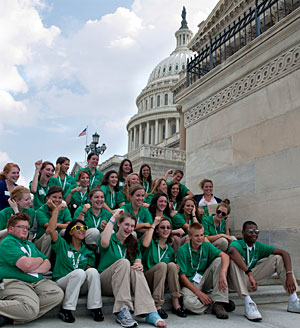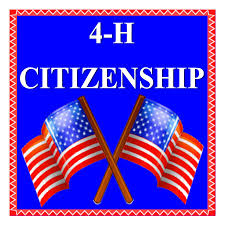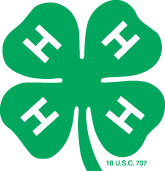4-H Citizenship is the knowledge, skills, attitudes and motivation that give youth the capacity to move beyond one's individual self-interest and to be committed to the well-being of some larger group.

Past Events
NJ State 4-H Legislative Leadership Experience
March 3 - May 1, 2025
The Legislative Leadership Experience brings the process of a bill becoming a law to life. Teens will learn about the legislative process in NJ and spend the day at the Capitol Building in Trenton discussing actual bills that are in the process of becoming a law. The Zoom meetings are mandatory for this experience.
Citizenship Washington Focus
June 21–27, 2025
Citizenship Washington Focus (CWF) is a leadership and civic engagement program conducted by the National 4-H Council for high school age youth. The program is run for six consecutive weeks during the summer months and New Jersey typically attends the second full week of July. It is held at the Hyatt Regency in Bethesda, Maryland just outside Washington, DC. Using Washington, DC as a working classroom, delegates learn about the government, citizenship, and civic education.
About 4-H Citizenship
Did you know that 4-H youth like yourself are:
- four times more likely to make contributions to their communities (grades 7-12)
- two times more likely to be civically active (grades 8-12)
These findings from a decade-long 4-H study on positive youth development conducted by Tufts University show that 4-H youth excel beyond their peers.....but that is something we already knew! Studies have also shown that young people experience cognitive, developmental, moral, academic, and personal growth from participation in citizenship activities, including service-learning and community service.
Citizenship, Engagement, Service Learning and Community Service... What's the Difference?
In the Citizenship Public Adventures Guide's Handbook, National 4-H Curriculum, it states, "Citizenship can be thought of as who or what we are, as what we believe, or as what we do."
4-H members are engaged in a variety of citizenship and service activities through their 4-H learning experiences but what is the difference between citizenship, civic engagement, service learning and community service? Read on to find out:
- Active Citizenship focuses on the collective action we take to address our common concerns. It emphasizes our on-going involvement in making the decisions and doing the work that creates the world around us. Source: Citizenship Public Adventures Guide's Handbook, National 4-H Curriculum (BU-08154), published by National 4-H Council, 2005.
- Civic Engagement means working to make a difference in the civic life of our communities and developing the combination of knowledge, skills, values and motivation to make that difference. It means promoting the quality of life in a community, through both political and non-political processes. Source: Civic Responsibility and Higher Education, edited by Thomas Ehrlich, published by Oryx Press, 2000.
- Service Learning is a teaching and learning strategy that integrates meaningful community service with instruction and reflection to enrich the learning experience, teach civic responsibility, and strengthen communities. It has clearly articulated learning goals and structured reflection. Source: National Youth Leadership Council.
- 4-H Community Service "In 4-H, service is commonly defined as the voluntary action of an individual or a group of individuals without pay. Service to the community – through food drives, raking the yard of an elderly neighbor, adopt-a-highway programs, teens teaching younger youth, teens mentoring children, or youth determining community needs and helping solve community problems – helps young people learn caring, leadership and citizenship." Source: Michigan State 4-H Youth Development
No matter which activity 4-H members take part in, they are working to make a positive difference in the lives of others and in local communities.

Resources
Want to know more about community service and service learning? Then visit these websites which highlight additional resources on community service and service learning:
Youth Service America (YSA)
YSA activates, funds, trains, and recognizes young people and their adult partners through various programs and opportunities. The website includes:
- Resources for large-scale mobilization campaigns, such as Global Youth Service Day and Semester of Service.
- Opportunities to apply for YSA Grants of approximately $1 million annually. YSA Grants are available to youth, educators, and organizations around the world for youth-led service projects.
- Resources and training that equip youth and their adult mentors to lead high-quality, high-impact service and service-learning programs.
- Awards that recognize exceptional youth and the adults who are champions of youth voice.
National Youth Leadership Council (NYLC)
NYLC provides leadership opportunities, training and resources to help youth address issues that matter to them. Youth can share ideas through various social media outlets. NYLC also allows adult leaders partner with other youth program leaders through networks and professional development opportunities. Also provides K-12 Service Learning Standards for Quality Practice.
Generation On
Generation On provides monthly service project ideas, youth blogs, information and resources on citizenship, avenues for idea sharing and information on grant and award opportunities.
Learning to Give
Learning to Give provides educational resources and activity ideas for youth, adults and leaders as well as links to many other citizenship based organizations and resources.

